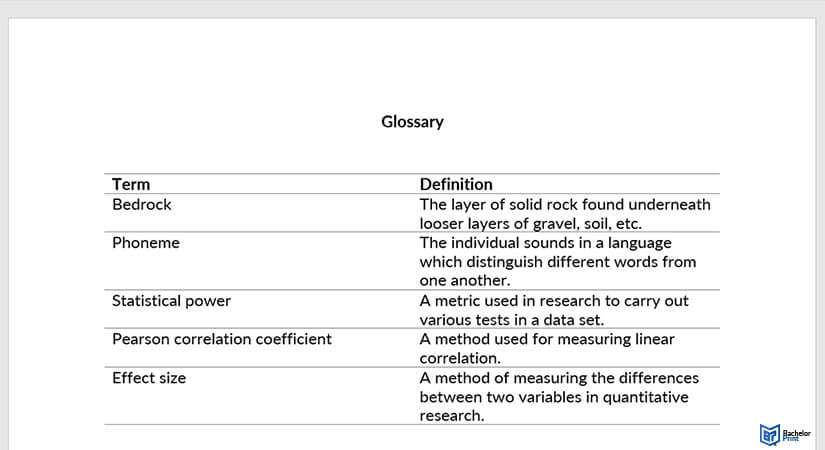
A dissertation is more than just a piece of narrative prose that guides readers through your research: It’s a sum of many distinct components that all make a vital contribution toward providing a complete contextual picture of the work that you have done. In this article, we will delve into the importance of a glossary, its role, and its structure in enhancing comprehension and effective communication in academic writing.
Definition: Glossary
Put simply, a glossary is a list of non-standard (i.e., technical or subject-specific) terms that you have used in your writing before printing the dissertation. They will be accompanied by an explanatory definition to add clarity for your readers, whilst also broadening your potential audience by reducing the barriers to entry that such language can often pose.
Take a look at the two examples below to see what we nasty:
Citing sources for a glossary
Generally speaking, you do not need to provide citations for your glossary entries, as definitions are considered to be a part of our shared “common knowledge“.
You may find, however, that you reference the definition in-text to provide a more explicit elaboration of a given point.
- ✓ 3D live preview of your individual configuration
- ✓ Free express delivery for every single purchase
- ✓ Top-notch bindings with customised embossing

5 tips for writing an effective glossary
The following delves into 5 helpful tips to write a dissertation glossary:
Meet your audience’s needs
As briefly alluded to, the content of the glossary should be shaped by your audience’s familiarity with the subject area.
Whilst you don’t want to under-explain the terms used in your dissertation, you should also be mindful of spending time and space explaining things that your readers require no clarification on.
Use plain language
K.I.S.S. Keep it simple, stupid!
Glossary entries should not include terms that also warrant defining. You don’t want to trap your readers in an infinite definition loop!
Don’t use the word in the definition
A glossary definition is useless if somebody needs to already know the word’s meaning to understand it.
Refer back to the point above, again and again!
Provide pronunciation tips
Explaining how the word is pronounced (whether through basic transcription or use of the IPA symbols) vastly increases the readability of your text.
This, in turn, helps your readers strengthen their understanding of the terms you’ve used.
Include synonyms, antonyms & examples
All of these can build out that invaluable context that helps your readers grasp what is often a very specific meaning.
Don’t be afraid to lean on the synonym posts on BachelorPrint for help here!
Other lists aside from the glossary
At the outset, we referenced a number of component parts that make up the dissertation and will go a little more in-depth on a couple of those here.
One list you will almost certainly want to include is the index, which breaks down key topics/themes/terms in your paper by the page(s) they appear on, allowing more casual readers to quickly identify the most relevant sections for their perusal.
Another would be the list of tables, figures, and illustrations used throughout your dissertation (if applicable). This is yet another way of making your paper into a more holistic piece of work that is more accessible to a wider audience.
Example of a glossary
Below is an example of how a glossary of a dissertation may look like.

FAQs
The term refers to a reference list of words that readers may not be familiar with.
It is derived from the Latin gloss, which means “word inserted as an explanation, translation, or definition”.
It will typically be included at the end as an appendix to the main body text, before the list of works cited.
No, but it’s certainly recommended if you’re using complex terminology.
If you find yourself drawing upon only a few such terms, you may prefer to include the definitions as footnotes instead, assuming that your style guide allows them.
There’s no hard and fast ruling here: the decision should be guided for the most part by your intended audience and how much knowledge of the subject-specific language they may or may not have.